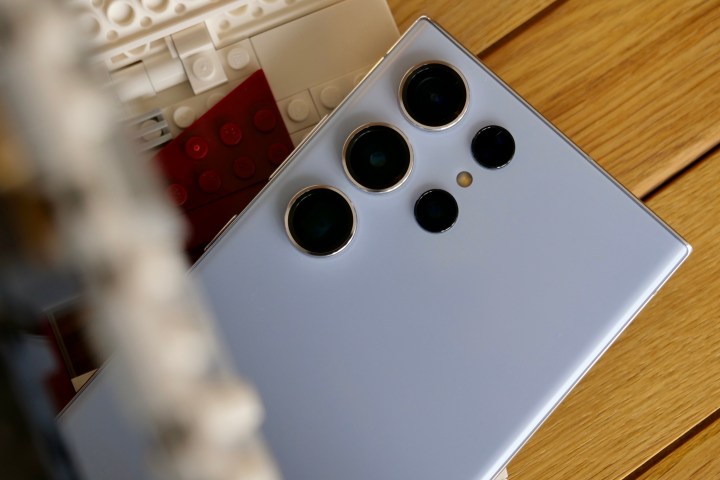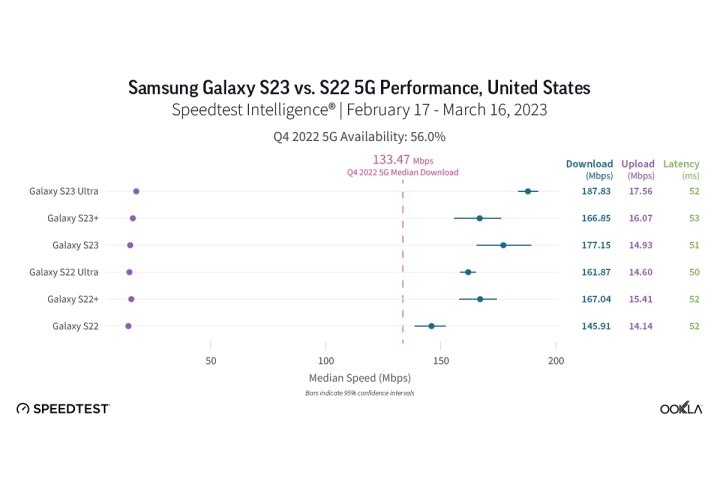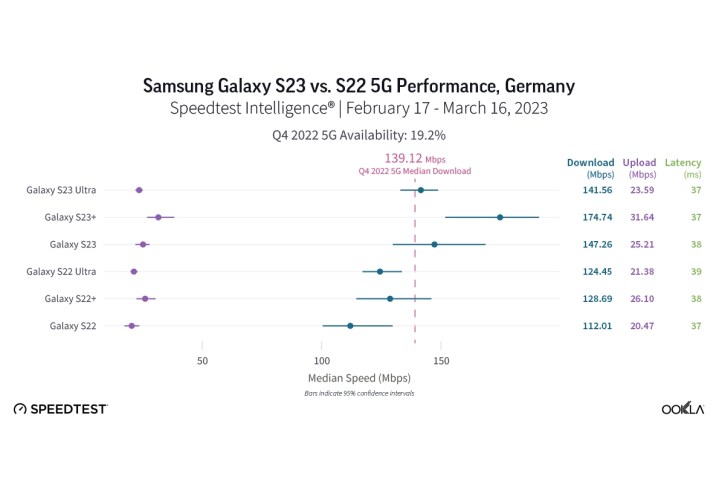If you’ve been on the fence about picking up one of the latest Galaxy S23 phones, some new research from Ookla may help tip the scales in Samsung’s favor.
In a new speed test report, Ookla tcompared the 5G performance specs of the Galaxy S23 models to last year’s Galaxy S22 in several countries — with some surprising results across the board.
A worthwhile 5G upgrade

In the U.S., Ookla found that the Galaxy S23 models generally outperformed their S22 equivalents by a healthy margin when it came to median download speeds. The Galaxy S23 saw a 21% performance gain over the Galaxy S22, while the Galaxy S23 Ultra showed 16% faster download speeds when compared to last year’s Galaxy S22 Ultra.

Specifically, the median download speed for the Galaxy S23 Ultra was measured at 187.83Mbps, while the Galaxy S22 Ultra came in at 161.87Mbps. The report also pegged the Galaxy S23 Ultra as the fastest across all six models. Surprisingly, the Galaxy S22 Plus edged out the Galaxy S22 Ultra, at 167.04Mbps versus 161.87Mbps, for the title of more powerful flagship.
While a 20% increase in 5G performance may not be enough to tip the scales if you’re already happy with your Galaxy S22, Ookla adds that you “shouldn’t hesitate to upgrade” if you’re looking for other features offered by the newer models.
Mixed results elsewhere
It wasn’t all sunshine and roses, though. In an unusual twist, Ookla found the speeds of the Galaxy S23 Plus and S22 Plus “were statistically too close to call,” coming in at 166.85Mbps and 167.04Mbps, respectively.
Since the entire Galaxy S23 lineup features the same Qualcomm Snapdragon 8 Gen 2 for Galaxy platform — a bespoke and souped-up version of the standard Snapdragon 8 Gen 2 that also includes Qualcomm’s powerful Snapdragon X70 5G modem — there’s no reason the Galaxy S23 Plus should perform that much differently from its other S23 counterparts.
Although there could be differences in the internal antenna design that might account for the lower performance, this is more a result of Ookla’s Speedtest Intelligence methodology. Performance metrics such as these are gleaned from folks who voluntarily test their network connections using Ookla’s Speedtest app. This means the data is only as accurate as the number of tests that are performed on a given device. Where those tests are performed is also a factor.
Ookla notes that over 10 million tests are run by users each day, which gives more than enough data to produce a statistically relevant analysis. However, the complex nature and variety of 5G deployments leaves room for these numbers to get a bit skewed.
This becomes more apparent when you put it up against the results from other countries in Ookla’s analysis. For instance, in Germany, the Galaxy S23 Plus ran circles around every other model, clocking in at 174.74Mbps. That’s 23% faster than the Galaxy S23 Ultra, and a 36% advantage over the Galaxy S22.

It’s worth noting that the Galaxy S23 models sold in Germany differ from the U.S. version, however, that’s mostly related to the low-band 5G frequencies that are unlikely to be delivering these kinds of speeds anyway. Ookla also discovered “seriously fast 5G speeds” among Brazilian Galaxy S23 users, reaching a peak of 494.18Mbps, once again measured on the Galaxy S23 Plus. Germany and Brazil share the same “global” Galaxy S23 models, which lack mmWave support, which means that the country has some impressively fast midband 5G coverage.
On the flip side, Galaxy S23 users in China saw no real improvement in 5G performance over the Galaxy S22 models. However, the S23 Plus wasn’t included in these stats as Ookla says it “didn’t meet the statistical threshold,” which likely means Ookla hasn’t collected enough speed test measurements from that particular model.
South Korea delivered the fastest Galaxy S23 5G performance overall, with a peak of 584.08Mbps on the Galaxy S23 Ultra. That’s not as surprising as it seems, though, since Samsung sells a specific Korean model of its Galaxy S-series phones that only support the faster 3.5 and 3.7GHz midband frequencies used in that country. Hence, there’s no low-band 5G to drag the median speeds down.
Your mileage may vary
While Ookla’s report offers up some interesting metrics, it’s important to remember that these are median download speeds across all carriers throughout an entire country. Statistically, the Galaxy S23 models offer faster 5G performance than their predecessors, but that’s to be expected as they include more advanced and modern 5G model chipsets and processors.
However, in the real world, your performance will be determined more by your carrier and what kind of 5G coverage is available where you live and work. T-Mobile and Verizon subscribers who are covered by their carrier’s 5G Ultra Capacity and 5G Ultra Wideband networks, respectively, will likely see speeds similar to what Ookla is reporting. However, if your Galaxy S22 shows a plain “5G” icon on your phone most of the time, unadorned by a UC, UW, or plus suffix, upgrading to a Galaxy S23 is not going to make nearly as much of a difference.
Editors' Recommendations
- 5 phones you should buy instead of the Samsung Galaxy S24 Plus
- 5 phones you should buy instead of the Samsung Galaxy S24
- Galaxy AI is now available for these other Samsung phones
- How fast is 5G? What you need to know about 5G speeds
- These Samsung phones are getting a big update this month



